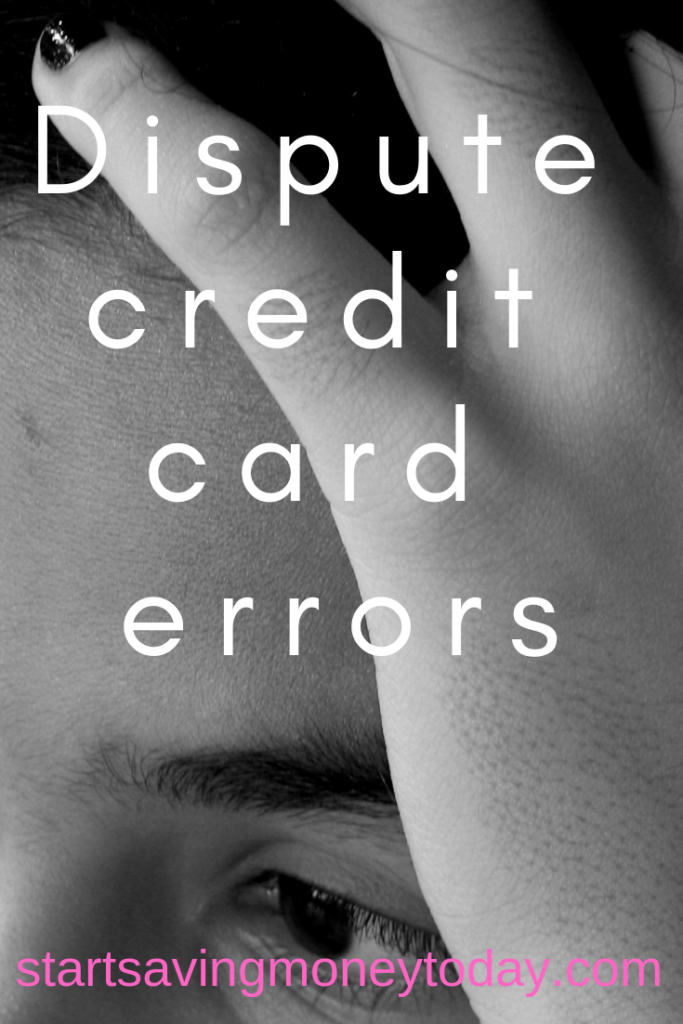Credit card disputes
I’ve never said, “Don’t use credit cards.” I do, however, continuously preach being debt free, and I hate credit card debt. So, I’m sure I really surprised some readers when I posted sometime back that I do use a credit card. In fact, I use a credit card for practically every purchase I make. But…I—daily—payoff any balance on my card; I don’t carry a balance. I also carefully monitor those charges for inaccuracies. If there are errors, you can be sure I’ll dispute them, first with the business from which I made the purchase. If that doesn’t provide satisfaction, I take it up with the bank that issued my card. Credit card disputes if used properly will protect the consumer.
The cash back option was the reason I started using a credit card. I’m not interested in a free movie or even a free trip. I’m very happy to receive money for every credit card purchase I make. That having been said, there are times when being faithful to my frugal lifestyle requires me to dispute a credit card charge.
Don’t get me wrong, I won’t file a credit card dispute just because I can. Making fraudulent claims is illegal and can lead to a lot of trouble. The only time I challenge a credit card entry is when it’s in error: an overcharge, a double charge, a defective or misrepresented product. That fits the frugal mindset. But, as I just said, first I’ll take my problem to the company I purchased from, but if the merchant won’t make it right, sometimes disputing a charge with the bank is the only frugal thing left to do.
Credit card vs cash purchases
A major advantage to using a credit card to make purchases is that with the right to dispute errors the customer has an added layer of protection. If you make a purchase with cash and discover you were overcharged or in some way are unhappy with the product, the merchant could choose neither to refund your money nor to make the purchase right. In that case, you may have to sue in order to have a satisfactory resolve. How much time and money would you expend on that process??? When you have problems with a credit card purchase, if the merchant won’t make the purchase right or refund the money back to your card, you still have another means to seek restitution: You can dispute the credit card charge. Again, if you are unhappy with a product or service you paid for by credit card, you can file a dispute with the bank that issued your card, but only after you have attempted, without success, to have the merchant fix the problem.
Credit card disputes are a serious matter
I don’t want to imply that filing a dispute is an everyday thing for me. That decision should be taken seriously and reflect a legitimate problem. Too many disputes determined to be fraudulent or arbitrary claims could lead to your credit card being cancelled or worse—legal proceedings against you.
There are times when disputing a charge is inappropriate—no matter how unhappy you are
Quite a few people with a credit card have a list of others on file with the bank that issued it. The people on that list are authorized to use the card to make purchases using the account, and each of them often has their own “copy” of the card… You know (eventually) whether it’s an inappropriate object or something the purchaser will default on paying for, someone is bound to make a purchase that offends the owner of the account—because, of course, the person who owns the account is financially responsible.
Well…
You can’t dispute a charge made by an authorized user just because you don’t like it. You gave permission for them to use your credit card. Only if there is a legitimate reason (see my list in the first section of this post) and the seller refuses to make it good can you dispute the charge. Your objection to the purchase isn’t reason enough to file a dispute. Here’s a scenario: Your son is a student at a college in another state. He lives in an off-campus apartment. You have him as an authorized user on your credit card account. You have him on the account in case he has an emergency. He uses his copy of your card to buy a high-end television, one with a large screen—so he and his buddies can really see the sports shows and play their electronic games. “You know Dad, it’s a lot more impressive than on my computer screen.” Reasonably, you’re fuming. Unfortunately, that he bought the tv isn’t reason enough to file a dispute. However, if the tv doesn’t work, you do have reason to contact the merchant. Then, if they don’t make it right, it might be time to file a dispute, but you need to have all the facts. Depending on the terms of the sale, the seller may have options: fix, replace, or refund. Again, your ire over the sale itself may not be sufficient for filing a dispute of the charge with the bank that issued your card(s), and yep! if the kid defaults on payments, you’re responsible.
What about fraud
There is a difference between an unsatisfactory purchase and fraud.
Let’s say you have no authorized users on your account, but there’s a charge on your statement from a gas station in Illinois. Well, you’ve never been to Illinois, and you didn’t use your card to make the purchase or authorize anyone to make a charge to your credit card account. Your number may have been comprised…
Don’t file a dispute in these circumstances: File a stolen card report and contact the people who handle fraud for your credit card company. (Actually, given the amount of fraud that happens, it’s likely the bank that issued you your card is monitoring your purchases for anything unusual. They may be in touch with you, questioning a charge, before you know anything is wrong. If you affirm that it wasn’t you that made the purchase, they may proceed to deal with it immediately: follow their directions
When to dispute a credit card
Incorrect information
Let’s face it, every one makes mistakes and that includes merchants. If you make a charge on your credit card, when you get your statement, you might find you’d been over-charged, double charged, the date of purchase was wrong (has to do with returns and warrantees), etc. Take these issues up with the merchant as soon as you know of them. If the merchant doesn’t fix the problem to your satisfaction, you may file a dispute with your issuing bank over the credit card charge.
Unsatisfactory purchase
Whether you bought online or in a brick and mortar store, if used your credit card to make a purchase and get home to find the product (in its packaging) is damaged, or that the retailer misrepresented the item, or it’s unsatisfactory in some other way (wrong size, wrong color, etc.) Contact the merchant; give them a chance to fix the problem. If they can’t or won’t fix the problem, you can file a dispute against that credit card charge.
Filing credit card disputes
You already know you should keep the receipts for your purchases, especially those made by credit card until the transaction posts. After all, there are three entities involved in the transaction—you, the merchant, and the credit card people. Any of you could be in error regarding issues like date of purchase and price, but your receipt gives you proof. This is important whether your dispute is with the merchant or the credit card company.
Research the Fair Credit Billing Act (FCBA) if you want to know your rights and how to handle a dispute with your credit card company, but in this post I’m addressing a dispute between you and a vendor.
So…you’ll have your receipt, and you’ll keep dated, detailed notes on your attempts to get satisfaction from the seller (times, dates, names of representatives, topics, resolutions offered/declined, etc.) Pictures of the item in question can be very helpful, also.
How to file credit card disputes
Have your facts right. (That’s why you kept a log of your interactions with the merchant.)
Make sure the charge has posted, not just pending. Gas stations and hotels frequently place a (fairly large) charge on your card when request authorization. It will be corrected when your transaction is actually posted.
In many cases you can file a dispute through your online statement by clicking the dispute button. You’ll answer a few questions, write a short narrative, and have a good start on the process. If that is not a clearly indicated option, you need to contact the bank that issued you your credit card. They will instruct you as to what to do; it might be something like contacting their department that handles those matters. (For information on who actually owns the credit card brands and the role of the issuing banks, here’s link to a short but interesting article titled “Who Owns the Credit Card Companies?”
After you have filed the dispute, you should follow it up with a letter (snail mail) reiterating the dispute. (This is not a requirement, but it makes good business sense.)
Here are a couple of final things about these disputes, and I dislike including them, but it’s necessary: Frequently, the dispute will be settled in your favor, and you’ll get a chargeback for the purchase. Sometimes, however, the findings will be for the merchant, in which case you will be considered responsible for the charge and legally required to pay it along with any accrued interest and late charges. Also, and especially if a large order or an expensive specialty item is at issue, a merchant could decide to sue—even if you win the chargeback billing dispute…As I said above, dispute is a serious matter. Of course, you also have suit option—if you consider it worth exercising.
My thoughts
I decided to write this article on disputing credit card charges because I do use my credit card so much. Although I rarely dispute a charge, it’s good to have recourse when needed. I view both the privilege of charging and the right to dispute a charge as tools that enhance my frugal lifestyle.
Among the characteristics of frugal people, are budgeting for the present and saving money for future. Sometimes, they may have a part time job to help meet their goals. Charging everything and paying it off every night is a practice that helps me. It only takes a minute, yet I earn extra money doing this since I have a card with cash back rewards. Another perk to using my card is that I’m more conscious of how much money I spend and where I spent it. That makes it easier to make my daily entries in my spending journal.
Being frugal is sometimes just a matter of finding what works best for you. Using my cash back credit card is a good fit for me and the right to dispute a charge adds to my sense of financial security. Of course, I don’t need to exercise that right often because most merchants are interested in keeping customers and do what they can to be accommodating rather than deal with credit card disputes.

